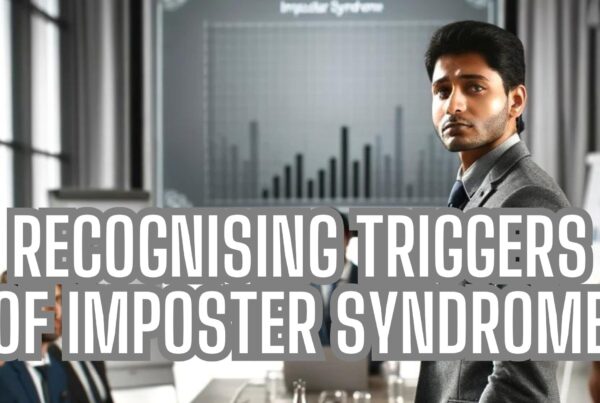Overcoming Impostor Syndrome: Unveiling the Mask of Self-Doubt
Impostor syndrome, a psychological pattern where individuals doubt their abilities and fear being exposed as a “fraud,” can significantly impact personal and professional life. This blog explores the nature of impostor syndrome and provides practical strategies to overcome it, ensuring you can achieve your true potential without self-imposed limitations.
Understanding Impostor Syndrome: The Psychology Behind the Syndrome
Impostor syndrome typically manifests as a relentless feeling of inadequacy that lingers despite clear evidence of success. Those experiencing this syndrome often attribute their achievements to external factors like luck, timing, or deceiving others into thinking they are more competent than they believe themselves to be. This self-doubt persists even in the face of consistent performance and validation, leading to a chronic fear of being exposed as a fraud. This fear is not just about failing at tasks; it’s a deeper worry about being unmasked as an impostor in every aspect of their professional and personal life.
Moreover, impostor syndrome doesn’t discriminate by job title or career level. It is prevalent across various professions and hierarchies, affecting people from entry-level employees to top executives. This universality stems from a common thread in human psychology – the tendency to undervalue our own competence and overvalue others’. Individuals stuck in this mindset find it challenging to internalize and accept their success, often feeling like they don’t truly belong in their roles or fearing that their luck will soon run out. This psychological pattern not only impacts their mental well-being but also hinders their ability to embrace new opportunities and challenges confidently.
Recognizing the Symptoms
Symptoms of impostor syndrome are often internal and can manifest in various ways, impacting both personal and professional aspects of life. The most common symptom is persistent self-doubt, where individuals question their abilities and accomplishments, despite evidence of their competence. This doubt often leads to an inability to realistically assess one’s skills, resulting in a skewed self-perception that undervalues genuine talent and overemphasizes perceived flaws. It’s a continuous struggle between what they know and what they feel about their capabilities.
Another significant symptom is the fear of being exposed as a fraud. This fear isn’t just about feeling unqualified; it’s a deeper worry that others will discover a supposed lack of ability or knowledge. This fear can lead to over-preparation, where individuals spend excessive time on tasks to ensure no fault can be found. Alternatively, it might result in procrastination – avoiding tasks due to the fear of failure or criticism. These behaviors are protective mechanisms, attempts to shield oneself from the perceived inevitable discovery of their ‘fraudulence.’ This constant battle with anxiety and fear of exposure can be draining and often hinders one’s ability to acknowledge and celebrate their achievements.
The Role of Personality and Background
The roots of impostor syndrome often stretch back to one’s upbringing and the environment in which they were raised. For many, growing up in a setting where there was a significant emphasis on success and achievement plants the early seeds of this syndrome. In such environments, praise and recognition are frequently tied to performance, leading individuals to equate their worth with their accomplishments. This environment can foster a perfectionist mindset, where the fear of failure becomes a dominant force driving their actions and thoughts. The constant pressure to meet high standards, often set by parents or guardians, ingrains a belief that anything less than perfect is unacceptable.
Personality Traits and Impostor Syndrome
Additionally, the role of personality traits in the development of impostor syndrome cannot be understated. People with certain personality characteristics, such as a tendency towards anxiety or neuroticism, may be more prone to experiencing impostor syndrome. These traits can amplify feelings of inadequacy and self-doubt, making individuals more susceptible to the belief that they are not as competent as others perceive them to be. Understanding the influence of these personality traits, along with the impact of one’s background, is crucial in addressing and managing the symptoms of impostor syndrome. Recognizing that these deep-seated beliefs and fears are often a product of past experiences can be a powerful step towards overcoming the feeling of being an impostor.
The Cycle of Doubt and Fear: Understanding the Implications
Impostor syndrome traps individuals in a relentless cycle of self-doubt and fear, creating a constant internal battle. This psychological pattern drives people to adopt overcompensating behaviors like perfectionism or excessive work. While such actions might offer temporary relief from feelings of being a fraud, they are unsustainable and often lead to burnout. This burnout not only affects mental health but can also reinforce the very impostor feelings one is trying to escape. The cycle thus becomes a self-fulfilling prophecy, where the fear of exposure drives behaviors that, paradoxically, might lead to the feared outcome.
To effectively break this damaging cycle, it is crucial to confront and challenge impostor thoughts head-on. This starts with the realization that feeling like a fraud is not a unique or isolated experience. Many competent and successful individuals share these feelings. Acknowledging that impostor syndrome is a widespread phenomenon can be comforting and reduce the sense of isolation. It’s important to affirm that your skills and achievements are genuine and deserving of recognition. By recognizing the value in your work and abilities, you can begin to dismantle the cycle of doubt and fear, allowing yourself to embrace your successes fully and authentically.
Strategies for Overcoming Impostor Syndrome
Overcoming impostor syndrome is a dual journey of building confidence and enhancing competence. Confidence goes beyond just believing in your abilities. It involves trusting in your ability to learn, grow, and adapt. This trust is not instant; it grows over time. It’s nurtured through consistent, incremental steps that validate your competence. Each challenge you face and overcome serves as proof of your capabilities. Gradually, this process shifts your internal narrative from doubt to confidence. It alters how you perceive and appreciate your skills and contributions.
Similarly, enhancing competence is critical. It’s not merely about gaining knowledge. It involves actively engaging in new learning experiences. You should seek feedback and seize opportunities to expand and apply your skills. True competence is shown in action. It’s the application and effective utilization of your skills in different scenarios. By immersing yourself in situations where you can practice and refine your abilities, you not only enhance your skills but also reinforce your self-belief. This blend of growing confidence and competence lays a strong foundation for overcoming impostor syndrome. It leads to a more satisfying personal and professional life.
Importance of a Support Network
A robust support network can provide the external validation and perspective needed to counter impostor syndrome. This network might include mentors, colleagues, friends, or therapists who can offer honest feedback, encouragement, and a reality check when self-doubt creeps in.
Sometimes, overcoming impostor syndrome may require professional help, especially when it significantly impacts your life. Therapists can provide strategies and tools to challenge and change the deep-seated beliefs that fuel impostor syndrome.
Celebrating Achievements and Success
Acknowledging personal achievements, regardless of scale, plays a pivotal role in combating feelings of fraudulence linked to impostor syndrome. Recognizing your successes helps internalize them. Consequently, you begin to see these accomplishments not as mere flukes or strokes of luck, but as direct results of your abilities, dedication, and consistent effort.
Moreover, embracing your victories, be they big or small, is instrumental in building a more positive self-image. It fosters a sense of genuine self-worth, which is crucial for overcoming impostor syndrome. Additionally, this practice extends beyond self-recognition. It involves sharing your successes with peers, mentors, or loved ones. This act of sharing can further validate your achievements.
Furthermore, this external validation, when combined with internal acknowledgment, forms a powerful antidote to the persistent doubts of impostor syndrome. By regularly acknowledging and taking pride in your achievements, you create a positive feedback loop. This loop strengthens your confidence and diminishes the power of impostor feelings. It effectively paves the way for a healthier and more balanced self-perception.
The Power of Positive Affirmation
Positive affirmations and self-talk can profoundly impact our self-perception. Regularly reminding ourselves of our successes and strengths can help shift our focus. This practice aids in internalizing success, fostering a healthier self-image. Remember, achievements, no matter their size, are a result of your skills, effort, and perseverance. Consequently, this understanding diminishes the grip of impostor syndrome on your self-perception.
Moreover, affirmations encourage a more positive outlook. They remind us of our capabilities, reinforcing our belief in ourselves. Consistently acknowledging our achievements lays the foundation for a robust and confident self-image. Therefore, the practice of positive self-affirmation is crucial. It not only combats feelings of inadequacy but also promotes a sense of genuine self-worth.
Ultimately, the use of positive affirmations is a powerful tool. It helps build a more affirmative self-image and reduces the influence of impostor syndrome. Remember, your skills and accomplishments are valid and worthy of recognition. So, embrace the power of positive self-talk to foster a healthier, more confident you.
Embracing Your True Potential by Overcoming Imposter Syndrome
Overcoming impostor syndrome is a journey of self-discovery and acceptance. By understanding its roots, addressing the underlying causes, and employing practical strategies, you can start to see yourself in a more positive and realistic light. Remember, you are capable, your achievements are valid, and you deserve your success.
Release Hypnosis Melbourne Hypnotherapy
Since 2016, Lawrence Akers has been working under the name Release Hypnosis offering Hypnotherapy and ACT based work to the people of Melbourne or an online service. Based on St Kilda Rd, Release Hypnosis is an easy and convenient location to get to and accessible by the ANZAC station train and tram stop. Release Hypnosis can help with a wide range of presenting issues, and I offer a free 30 minute no obligation discovery call for those who are unsure if hypnotherapy is the right way forward for them.
Book Your FREE 30 Minute Consultation With Release Hypnosis NOW!
Get the FREE Overcoming Imposter Syndrome Mini-Email Course!
You may also like to read:
Discovering Purpose and Values: A Path to Mental Well-being
Can’t Visualise in Hypnosis? Here’s What You Can Do Instead.
Dealing with Financial Stress and Crisis: Finding Peace Amid Turbulence
What Is The Success Rate of Hypnosis?
Release Hypnosis Melbourne Hypnotherapy is accessible for people in: Abbotsford, Armadale, Albert Park, Balwyn, Bentleigh, Black Rock, Box Hill, Brighton, Brunswick, Bulleen, Bundoora, Camberwell, Canterbury, Carnegie, Caulfield, Chadstone, Cheltenham, Clayton, Coburg, Collingwood, Deer Park, Doncaster, Elsternwick, Eltham, Elwood, Epping, Essendon, Fairfield, Fitzroy, Footscray, Glen Iris, Glen Waverley, Glenhuntly, Greensborough, Hampton, Hawthorn, Heidelberg, Highet, Ivanhoe, Kew, Kooyong, Lalor, Laverton, Lower, Plenty, Macleod, Malvern, Middle Park, Moonee Ponds, Melbourne, Moorabbin, Mount Waverley, Murrumbeena, Northcote, Oakleigh, Ormond, Parkville, Pascoe Vale, Port Melbourne, Prahran, Preston, Richmond, Rosana, Sandringham, South Yarra, South Melbourne, Spotswood, St Albans, St Kilda, Surrey Hills, Templestowe, Thornbury, Toorak, Tullamarine, Williamstown, Yarraville, North Melbourne, Windsor, East Melbourne, Melbourne, Melbourne CBD, Melbourne 3004








